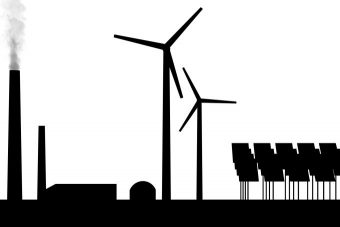
A team of US scientists have set out an ambitious roadmap they say will lead to 139 countries around the world switching to 100 per cent renewable power, a result that would limit global warming to under 1.5 degrees and create more than 24 million new long-term jobs.
The energy roadmaps, published online in the science journal Joule yesterday, were compiled by a team of researchers led by Professor Mark Jacobson, director of Stanford University’s Atmosphere and Energy Program.
They set out a path to transform the energy infrastructure of 139 countries to run solely on power generated from wind, water and sunlight. This includes the electricity, transportation, heating and cooling, industry, agriculture, forestry and fishing industries of more than 70 per cent of the countries in the world, representing 99 per cent of the world’s carbon dioxide emissions.
The team argue that such a conversion to clean power by 2050, while ambitious, will create around 24.3 million more permanent full-time jobs than those lost from retiring the fossil fuel industries. Around 4.6 million premature deaths would be prevented from air pollution, and $28.5tr in climate costs would be avoided every year by 2050.
“It appears we can achieve the enormous social benefits of a zero-emission energy system at essentially no extra cost,” co-author Mark Delucchi, a research scientist at the Institute of Transportation Studies, University of California, Berkeley, said in a statement. “Our findings suggest that the benefits are so great that we should accelerate the transition to wind, water, and solar, as fast as possible, by retiring fossil-fuel systems early wherever we can.”
Previous studies have shown it is technically possible to transition dozens of countries around the world to 100 per cent renewable power, but question marks remained over whether the feat would be economically or politically feasible.
For each of the 139 countries the researchers assessed the raw renewable resources available, the volume of wind, water and solar generators that would be needed to power the country’s entire energy needs, and how much land and rooftop space this would take up.
Using projected power demand for 2050 the researchers found the overall cost to society to switch to clean energy would be one quarter of the current fossil fuel system, once the avoided costs of tackling climate change are included.
It would also vastly improve the energy system’s efficiency, the research argues. Cutting out the mining, transport and refining of oil, gas and uranium alone would slash international power demand by 13 per cent, while energy demand overall would also fall a further 23 per cent, the researchers predicted, thanks to the greater efficiency of electricity.
“Transitioning should also stabilise energy prices because fuel costs are zero, reduce power disruption and increase access to energy by decentralizing power, and avoid 1.5C global warming,” the paper adds.
Of the nations analysed, the US, China and EU member states were predicted to have the easiest task thanks to their smaller population density, compared to densely populated nations such as Singapore, which may have to draw on technology such as floating solar to deploy enough generation capacity.
Source: businessgreen.com



